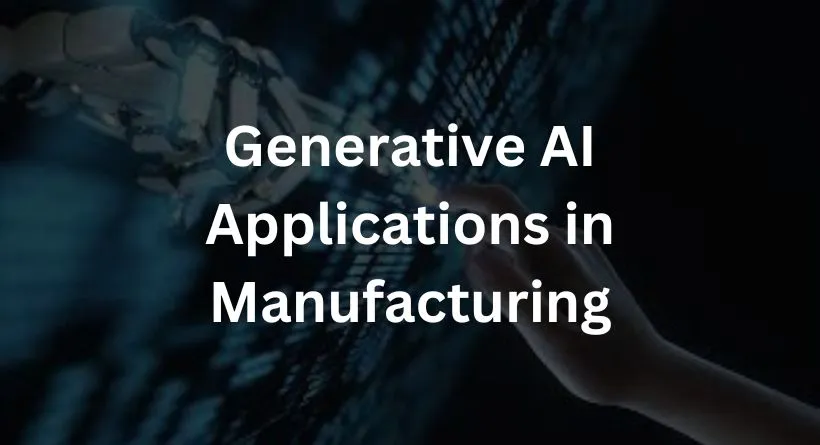
In today’s ever-evolving industrial landscape, the integration of cutting-edge technologies and innovative processes is paving the way for a new era of smart production. At the heart of this transformation lies generative AI, a powerful form of artificial intelligence with the potential to drive unprecedented levels of efficiency, innovation, and competitiveness in the manufacturing sector of the future.
The Role of Generative AI in Industrial Automation

Generative AI is set to revolutionize how we approach industrial automation. This remarkable technology has the capacity to create new data from existing information, making industrial processes more efficient, adaptable, and flexible in response to the dynamic demands of the global market. In this article, we will delve into the multifaceted ways generative AI is shaping the future of industrial automation, particularly in the areas of production optimization, product design, quality control, and supply chain management.
You may also like reading: Generative AI Applications in the Oil & Gas Industry
Use Cases in Manufacturing
1. Production Optimization through Generative AI
One of the most significant applications of generative AI in industrial automation is its role in optimizing production processes. By analyzing vast volumes of production data, generative AI algorithms can identify patterns, trends, and inefficiencies. This valuable insight empowers manufacturers to make informed decisions regarding resource allocation, production scheduling, and machine utilization. Furthermore, generative AI enables the modeling and simulation of various production scenarios, helping manufacturers devise effective strategies for maximizing output and minimizing costs. This not only boosts production efficiency but also reduces waste and environmental impact.
2. Accelerating Product Design and Innovation

Generative AI is a game-changer when it comes to product design and innovation. By leveraging AI-driven algorithms, designers can explore a multitude of design solutions, swiftly identifying the most promising options and refining them to meet specific requirements and constraints. Generative design tools, powered by AI, also assist manufacturers in discovering new materials and manufacturing techniques, expediting the development of cutting-edge products. Embracing generative AI, manufacturers open the door to boundless creativity and innovation, shaping the future of manufacturing.
3. Enhancing Quality Control through AI-Driven Automation
Quality control is paramount in manufacturing, ensuring that products meet the required standards and specifications. Generative AI plays a pivotal role in enhancing quality control processes, automating routine tasks, and enabling more accurate and efficient inspection and testing. Through the analysis of production data and machine learning algorithms, generative AI can pinpoint potential quality issues and defects, allowing manufacturers to take corrective action before problems escalate. This results in improved product quality, reduced recalls, and a strong market reputation.
4. Streamlining Supply Chain Management with Generative AI
Effective supply chain management is vital in today’s globalized economy. Generative AI enables manufacturers to analyze extensive supply chain data, identifying potential bottlenecks and inefficiencies. This empowers them to optimize logistics, inventory management, and resource allocation. The outcome is significant cost savings and enhanced responsiveness to market demand fluctuations.
5. Empowering Workforce Development with AI-Driven Training and Support
Generative AI is not limited to production processes; it also plays a crucial role in workforce development. AI-driven training and support tools offer personalized learning experiences, ensuring employees acquire new skills and knowledge quickly. This keeps the workforce up-to-date with industry trends and developments, leading to increased productivity, employee satisfaction, and retention.
6. Enabling Predictive Maintenance with Generative AI

Generative AI also contributes to predictive maintenance, reducing downtime and optimizing production levels. By analyzing sensor and monitoring data, AI-driven algorithms can predict and prevent equipment failures. This proactive approach leads to cost savings, improved equipment effectiveness, and increased safety for employees.
7. Driving Sustainability through AI-Driven Optimization
Amid growing pressure to adopt sustainable practices, generative AI aids manufacturers in reducing their environmental footprint. By analyzing production data, generative AI identifies areas of inefficiency, helping manufacturers optimize processes, reduce energy consumption, and minimize waste. Embracing generative AI showcases a commitment to sustainability and corporate responsibility, attracting environmentally conscious customers and investors.
Conclusion
Generative AI is poised to redefine the future of manufacturing. By harnessing the power of AI-driven innovation, manufacturers can enhance productivity, product quality, and sustainability while maintaining a competitive edge in a rapidly evolving global market.
FAQs
1. How does generative AI benefit manufacturing?
Generative AI enhances manufacturing by optimizing production processes, accelerating product design, improving quality control, streamlining supply chain management, empowering the workforce, enabling predictive maintenance, and promoting sustainability.
2. What is the significance of quality control in manufacturing?
Quality control ensures that products meet required standards and specifications, enhancing the reputation of manufacturers and reducing costly recalls.
3. How can generative AI drive sustainability in manufacturing?
Generative AI helps identify areas of inefficiency, enabling manufacturers to reduce energy consumption and waste, aligning with sustainable practices and corporate responsibility.
4. What is the role of generative AI in workforce development?
Generative AI aids workforce development by offering personalized training experiences, helping employees acquire new skills and stay updated with industry trends.
5. How does generative AI contribute to predictive maintenance in manufacturing?
Generative AI analyzes data from sensors and monitoring systems to predict and prevent equipment failures, reducing downtime and enhancing safety for employees.





